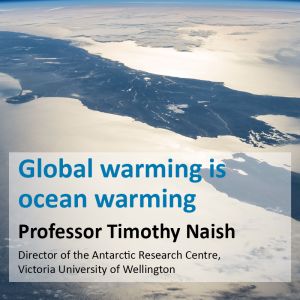Each day during the month of April, the Institute will feature one of the 30 ‘perspectives’ from the One Ocean report. These short articles include a diverse range of views regarding oceans management in New Zealand. Enjoy!
Today:
Global warming is ocean warming
The oceans provide an enormous and effective heat sink that is suppressing the rate and magnitude of the Earth’s surface warming. The IPCC reports that 93 percent of the heat generated by anthropogenic global warming has been stored in the ocean, three percent into melting ice, three percent into warming of continents and only one percent into the atmosphere. In other words, global warming is for now ocean warming!
Around the Antarctic the deep, well-mixed Southern Ocean has warmed at 0.05°C per decade since 2020 – a greater rate than the global ocean average, and faster than the deep ocean anywhere else on the planet. Southern Ocean heat uptake is suppressing surface warming and as a whole, Antarctica is warming no faster than the global average.
Then why do satellite observations of the West Antarctic Ice Sheet show a doubling in the rate of mass loss over the last five years? Changes in ocean circulation linked to global warming are bringing filaments of warm circumpolar deep waters into contact with the West Antarctic Ice sheet. These 1–2°C warmer waters are melting and destabilising ice shelves and causing coastal glaciers to retreat back into deep basins where large volumes of ice sitting well below sea level are vulnerable to rapid collapse.
So, while ocean warming may be suppressing the pace of global surface warming for now, the built-in heat content of the ocean represents a significant commitment to future changes. Some scientists argue that collapse of large parts of the West Antarctic Ice sheet contributing one to three metres of sea level rise may already be unstoppable no matter how we limit future greenhouse gas emissions.






















![20160906 McGuinness Institute - TacklingPovertyNZ Workshop – Far North Flyer [FINAL]](/wp-content/uploads/20160906-McGuinness-Institute-TacklingPovertyNZ-Workshop-%E2%80%93-Far-North-Flyer-FINAL-1-50x50.png)